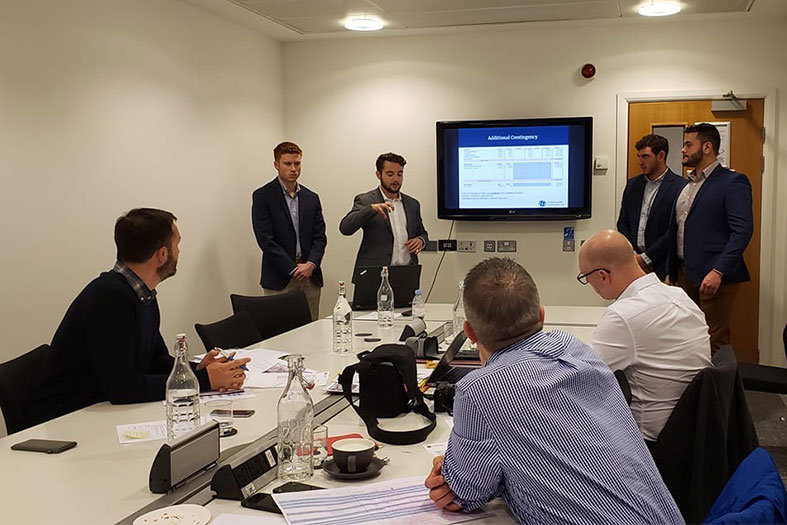RWU Students Win First Place in International Construction Management Competition
A team of undergraduate and graduate students bested thirteen teams from around the world to claim the top placement for Construction Management/Quantity Surveying at the Associated Schools of Construction International Student Competition in Manchester, U.K.

MANCHESTER, United Kingdom– Imagine that your construction crew arrives on site to find that there is extensive work to do before you can begin the project at hand. What was thought to be a site free from obstruction contains an existing foundation with 60-foot concrete piles buried in the ground. How do you approach this unexpected demolition project with minimal disruption to the surrounding community, your time and your budget?
An innovative solution to this hypothetical problem won a team of Roger Williams University construction management students first place for Construction Management/Quantity Surveying at the Associate Schools of Construction (ASC) Region 8 International Student Competition. Their international victory is a first in school history, building on years of success in ASC competitions regionally and nationally.
On November 7, RWU undergraduate construction management majors Greg Pomerleau, Nate Dionne and Sebastian Leo, and graduate student Jonathan Gomes were given nine hours to develop a response to the demolition scenario. Careful research and creative thinking led the team to a solution that the ASC judges, industry professionals from renowned construction firms, had never before seen.
“The site was located on a quay (a solid waterfront platform built for ship use) with water surrounding it and the piles had to be removed with minimal vibration and noise because of occupied buildings,” Pomerleau said.
Typical methods of removing piles are loud and intrusive, so the RWU team had to brainstorm a method for removal that wouldn’t wake the neighbors. Working collaboratively, the team prepared a plan that addressed every concern, including minimizing the disturbance from demolition.

“A pile is made of cylinder-shaped concrete drilled into soil. [The team] decided to take a large pipe drill, slip it over the pile as close as you can get, and drill down, then take another pipe casing and drill it over that one to release the surface tension in the soil. Then they could pull it all out. It was very unique,” explained RWU Associate Professor of Construction Management Michael Emmer, who accompanied the team to the competition.
The judges described the RWU team as extremely well prepared, poised and innovative in solving a challenging construction management problem.
With pride in his team’s victory, Gomes said, “We got to show a lot of people that a small school in Bristol, Rhode Island has a really good program.”
RWU teams have built an impressive history of accomplishments in regional and national ASC competitions. Each year, the university sends three teams to the Region 1 competition in Albany, NY. Out of the 24 schools in the region, RWU has earned the most placements, consistently placing at least two teams in the top three. Earlier this year, an RWU team placed second in the 2019 ASC national competition.
In addition to sending a team to the international competition this year, several more RWU teams carried on their tradition of success in this fall’s Region 1 competition. The RWU design-build team finished first, the heavy-civil team finished third, and the commercial team missed third place by a half point.
RWU’s construction management program connects theory to practice, providing students with opportunities like participating in ASC competitions, where students are challenged to work together to solve problems similar to those they will face in their careers, according to Emmer.
“You show up to a job at 8 a.m. and the boss says, ‘We have a problem with this job. I need a solution by 5.’ That’s what our careers are about: problem solving,” Emmer said.
Pomerleau found both of his internships and his future job through participating in ASC competitions. He met representatives from the Whiting-Turner Contracting Company at the 2017 ASC Region 1 competition career fair and was offered a summer internship for the 2018 season. That opportunity grew to include a 2019 summer internship and an offer of employment which will commence after Pomerleau’s graduation in May.
“All these competitions for students are great résumé builders,” he said. “Career professionals who come to these, especially the judges, know you are putting the time in to excel. That’s why I emphasize getting involved early.”
Emmer agrees that the experience of applying learned skills to real-life scenarios makes ASC competition participants attractive to employers. Success in a competition, he says, is proof that a construction management student is well prepared for the challenges they may face in the workforce.
“When contractors see that students have been on a winning competition team they know they are the best of the best,” Emmer said.